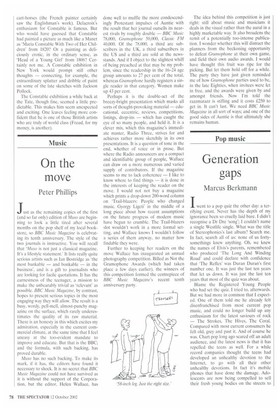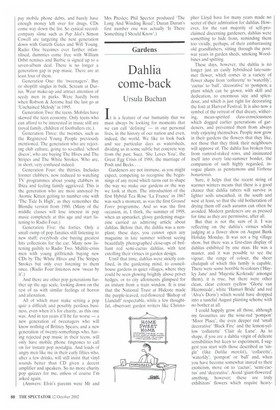Pop music
Generation gaps
Marcus Berkmann
Iwent to a pop quiz the other day: a terrifying event. Never has the depth of my ignorance been so cruelly laid bare. I didn't recognise a Dr Dre `song'; I couldn't name a single Westlife single. What was the title of Stereophonics's last album? Search me. In fact, search all of us: none of us fortysomethings knew anything. Oh, we knew the names of Elvis's parents, remembered who produced 'The Long And Winding Road' and could declare with confidence that 'The Reflex' was Duran Duran's first number one. It was just the last ten years that let us down. It was just the last ten years that most of the quiz was about.
Blame the Registered Young People who had set the quiz. I tried to, afterwards. But we had more in common that I expected. One of them told me he already felt disenfranchised from most current pop music, and could no longer build up any enthusiasm for the latest saviours of rock — The Strokes, The Hives, The Coral. Compared with most current consumers he felt old, grey and past it. And of course he was. Chart pop long ago scared off an adult audience, and the latest news is that it has repelled the teens as well. For a while record companies thought the teens had developed an unhealthy devotion to the Internet, to go with all their other unhealthy devotions. In fact it's mobile phones that have done the damage. Adolescents are now being compelled to sell their fresh young bodies on the streets to
pay mobile phone debts, and barely have enough money left over for drugs. CDs come way down the list. So cynical recordcompany slime such as Pop Idol's Simon Cowell are targeting the next generation down with Gareth Gates and Will Young. Radio One becomes ever further infantilised, dummies come free with William Orbit remixes and Barbie is signed up to a seven-album deal. There is no longer a generation gap in pop music. There are at least four of them.
Generation One: the `tweenagers'. Buy or shoplift singles in bulk. Scream at Darius. Wear make-up and attract attention of seedy men in parks. Were hardly born when Robson & Jerome had the last go at 'Unchained Melody' in 1995.
Generation Two: the teens. Mobiles have skewed the teen economy. Only teens who can afford to be interested in music still are (royal family, children of footballers etc.).
Generation Three: the twenties, such as the Registered Young People previously mentioned. The generation who are rejecting club culture, going to so-called `school discos', who are buying The Hives and The Stripes and The White Strokes. Who are, in short, very confused indeed.
Generation Four: the thirties. Includes former clubbers, now reduced to watching TV programmes about young clubbers in Ibiza and feeling faintly aggrieved. This is the generation who are most annoyed by Atomic Kitten getting to number one with 'The Tide Is High', as they remember the Blondie version from 1980. (Many of the middle classes will lose interest in pop music completely at this age and start listening to Radio Four.) Generation Five: the forties. Only a small rump of pop fanatics still listening to new stuff; everybody else buying greatest hits collections for the car. Many now listening guiltily to Radio Two. Midlife-crisis men with young girlfriends buying new CDs by The White Hives and The Stripey Strokes but only ever listening to them once. (Radio Four listeners now 'swear by it'.) And there are other pop generations further up the age scale, looking down on the rest of us with similar feelings of horror and alienation.
All of which must make setting a pop quiz a difficult and possibly perilous business, even when it's for charity, as this one was. And in ten years it'll be far worse — a new generation of tweenagers who will know nothing of Britney Spears, and a new generation of twenty-somethings who, having rejected pop music in their teens, will only have mobile phone ringtones to call on for instant pop nostalgia. And loads of angry men like me in their early fifties who, after a few drinks, will still insist that vinyl sounds better than CD given a decent amplifier and speakers. So no more charity pop quizzes for me, unless of course I'm asked again.
(Answers: Elvis's parents were Mr and Mrs Presley; Phil Spector produced 'The Long And Winding Road'; Duran Duran's first number one was actually 'Is There Something I Should Know'.)



































































































 Previous page
Previous page